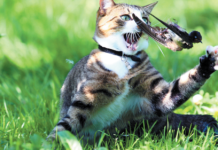Some advice for weight loss
Q My cat, Buddy, is obese. He is very long, and weighs close to 29 pounds. Our veterinarian says we should try to get him down to 20 pounds. He has been tested for a thyroid problem, and it appears that this is not the issue.
My veterinarian consulted with a colleague, who thought it may be that Buddy is not able to process carbohydrates. We’ve reduced Buddy’s total calories to around 325 per day. However, we still cannot get his weight down. Buddy likes his dry food better than wet, so I don’t want to eliminate it entirely. He often begs for more food. Any suggestions?
Doreen Piellucci
A Dear Doreen: It is hard to know what weight is ideal for your cat without seeing him, but most domestic cats that are not at least part Maine Coon should be well under 20 pounds.
While some cats do seem to do better on diets that are lower in carbohydrates, I have found that it is more likely to be excess calories that cause obesity rather than excess carbohydrates. There are some studies that support my clinical impression, whereas there are no current studies that show that cats lose more weight on lower carbohydrate diets than higher carbohydrate diets if the calories are equivalent.
It can be difficult to estimate where to start in terms of calories for overweight cats because some of them have very low calorie needs for the “lean cat inside” — and the extra fat doesn’t increase their needs. In my experience, most cats need MUCH less food than typical calculations would predict in order to lose weight.
The reason why many weight loss plans fail is due to not regularly weighing the cats, and subsequently adjusting the amount of food. It is typically safe for an otherwise healthy cat to lose around one percent of initial body weight per week. So, for a 28-pound cat, this would be about four to five ounces per week. I encourage cat owners to buy a baby scale so they can weigh their cat at the same day and time every week or two. We typically start out with 20 percent less calories than the owner is currently feeding.
Every time the cat doesn’t meet his weight loss goal, we reduce the amount of calories depending on how much was lost, and then weigh the cat again one to two weeks later. The biggest mistake pet owners make with weight loss plans is not sticking with the program of frequent weighing and adjustment of food amounts!
I also recommend that owners weigh out the food on a gram scale because this allows for easy adjustments in feeding amounts. My rule of thumb is that if you find yourself needing to feed less than 200 calories per day for your cat to lose weight, then you need to make sure that you are feeding a diet obtained from a veterinarian that is specifically designed for weight loss for cats. Many diets you can buy at the pet store do not have enough nutrients to allow safe feeding of very low amounts of calories.
When my clients have problems with begging, I usually recommend using foods that are lower in calories so that their cat gets more volume of food per day. The dry foods you are currently feeding are very high in calories — 500 to 600 calories per cup — so you can’t feed much of them to a cat with low energy needs. Unfortunately, nearly all of the dry low carbohydrate diets are extremely high in calories.
In comparison, most veterinary foods designed for weight loss for cats are between 230 to 350 calories per cup. Another idea to try is to feed dry food out of a food-dispensing toy: It can slow down eating speed and make the cat exercise a bit (and alleviate boredom), which can also help when you can’t feed a lot of calories or volume of food.
After starting a program of weighing your cat weekly and reducing his food accordingly —and you still don’t see appropriate weight loss — I would recommend considering a consultation with a board-certified veterinary nutritionist because these specialists tend to have a lot of experience dealing with frustrating cat weight loss cases. They can help you to develop a plan that works for you and your cat.
Kudos for working to get your cat down to a healthier body weight!
Cailin Heinze, VMD, MS, DACVN
Assistant Professor of Nutrition
Cummings School of Veterinary
Medicine at Tufts University



